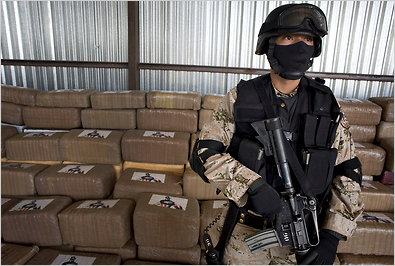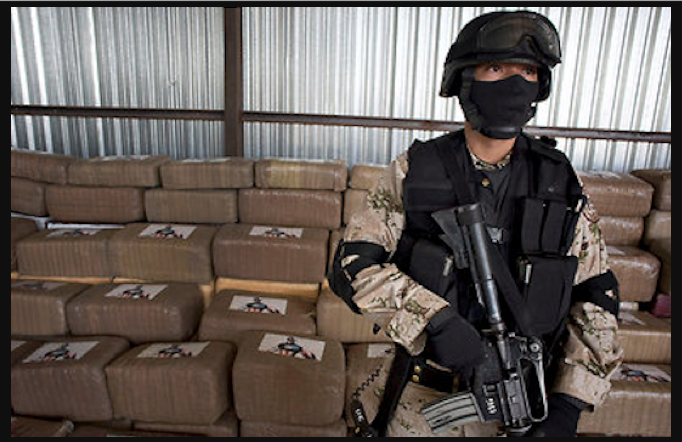Mexican Supreme Court Upholds Civilian Control in Drug War
In a key 8-2 decision on Tuesday, August 21, Mexico’s Supreme Court struck down the core provision of a law that had allowed the military to try criminal offenses against civilians by military tribunals. [1] A crucial decision for preserving civilian power over the uncertain and often questionable judgment of the military, this ruling once again reveals the damage that Mexico’s Drug War has done to the Mexican people and the country’s rule of law.

The case involved the June 2009 killing of Bonfilio Rubio, an indigenous man, after soldiers fired on his bus at a checkpoint near the town of Huamuxtitlan, in southern Mexico. [2] The military’s attorney argued that it had jurisdiction over the case since part of the military code, Article 57 II (a), read that all crimes committed by soldiers on duty are considered crimes concerning military conduct, rather than crimes against civilians. [3] However, a Mexican federal law ensures that “military courts in no case and for no reason may extend their jurisdiction over people who do not belong to the army.” [4] The Supreme Court therefore maintained that a military tribunal for military offenses against civilians was found to be blatantly unconstitutional.
Mexican civilians criticized the former provision, asserting that both themselves and relatives had been victims of the code. The outrage started in 2006, after then-president Felipe Calderón scattered the army to many parts of the country to crush warring drug cartels, resulting in conflicts that approached the scale of a civil war. Thus, allegations of military misconduct increased with the death toll. [5]
According to Human Rights Watch, between 2007 and 2012 Mexican military forces have brought forth about 5,000 cases of alleged criminal wrongdoing, with only 38 ending in sentences. [6] In addition, only 11 of those sentenced during this period were punished for crimes committed before 2007. This has led human rights activists to criticize the provision, believing it has “allowed security forces to take over cases and protect soldiers accused of abusing, torturing and executing civilians.” [7] The Inter-American Court of Human Rights (IACHR), which has jurisdiction over Mexico, has urged the government to reform its military justice code, and it ruled in 2009 that military jurisdiction could not apply to any civilian case where human rights were violated. Despite promises by President Calderón to abide by the IACHR’s ruling, Mexico has seen little change. [8]

Indeed, as the human rights activists and international courts claim, abuses have long taken place when cases were brought before military jurisdiction. According to one organization, a major reason for persistent human rights violations is that the military justice system “lacks the independence and impartiality to judge its own.” [9] The Mexican secretary of defense carries substantial power over the armed forces, both executive and judicial. Military judges do not have the same sense of independence and security as ordinary civilian judges because the secretary can remove them on virtually any whim, even for decisions that the secretary personally dislikes. In addition, civilian review of military court decisions is very limited, meaning that actual public scrutiny of such decisions can take as many as ten years. [10]
While this is a landmark decision in Mexican legal history, it still did not set a binding precedent. The court will need to issue five separate rulings in different cases to do so, but the court has already partly fulfilled these requirements. Recently it also issued a ruling holding that when the victim in an alleged crime is a civilian, a civilian judge should oversee the case. Additionally, the Supreme Court has yet to rule on 27 other cases involving offenses against civilians by military personnel. [11] Hopefully, the Supreme Court will continue to rule in favor of civilian-led legal inquiries, and right the wrongs committed by the military throughout the Mexican War on Drugs.
Despite the human rights abuses that the War on Drugs has created, a poll conducted by the Pew Research Center in June indicates that 80 percent of the Mexican population continues to support the military’s involvement in the fight against the drug cartels. [12] Yet evidence already shows that the current path has led to 50,000 deaths throughout the country while doing very little to actually stop drug use. [13] Regardless of what one thinks of the Mexican government’s campaign against drugs, it is clear the current path is a gross failure and has led to horrific corruption, death and destruction. Before moving on with a more realistic way to handle drugs, Mexican authorities therefore must handle the issue of corruption, which this decision has helped initiate. But far more will need to be done to assure a more reasonable drug policy while also protecting the people of Mexico from unnecessary bloodshed.
Justin Halatyn
Research Associate at Council on Hemispheric Affairs
Please accept this article as a free contribution from COHA, but if re-posting, please afford authorial and institutional attribution. Exclusive rights can be negotiated.
[1] Associated Press. “Mexico Supreme Court Declares Unconstitutional Key Part of Military Law on Crime Jurisdiction”. The Washington Post, 21 August 2012. http://www.washingtonpost.com/world/the_americas/mexicos-supreme-court-declares-key-part-of-military-law-unconstitutional/2012/08/21/647ecf0a-ebf6-11e1-866f-60a00f604425_story.html.
[2] Associated Press. “Mexican Judges Strike Down Law Protecting Army from Civilian Courts.” The Guardian, 22 August 2012. http://www.guardian.co.uk/world/2012/aug/22/mexican-judges-soldiers-court
[3] “Mexico: Supreme Court Limit on Military Jurisdiction Must Become Binding Precedent”. Amnesty International, 22 August 2012. http://www.amnesty.org/en/news/mexico-supreme-court-limit-military-jurisdiction-must-become-binding-precedent-all-courts-2012-
[4] “Mexico’s Supreme Court Rejects Military Trials Code”. BBC News, 22 August 2012. http://www.bbc.co.uk/news/world-latin-america-19343919
[5] “Mexico’s Military Law Unconstitutional, Supreme Court Says”. Fox News Latino, August 22, 2012. http://latino.foxnews.com/latino/news/2012/08/22/mexico-military-law-unconstitutional-supreme-court-says/
[6] Ibid.
[7] “Mexico: Court’s Historic Opportunity to Address Military Impunity”. Human Rights Watch, August 6, 2012. http://www.hrw.org/news/2012/08/06/mexico-court-s-historic-opportunity-address-military-impunity
[8] Ibid.
[9] Ibid.
[10] Ibid.
[11] Licon, Adriana Gomez. “Mexican Court: Military Law is Unconstitutional”. ABC News, August 22, 2012. http://abcnews.go.com/International/wireStory/mexican-court-military-law-unconstitutional-17053859#.UDuf9KDh-So
[12] “Mexicans Back Military Campaign against Cartels”. Pew Research Center, June 20, 2012. http://www.pewglobal.org/2012/06/20/mexicans-back-military-campaign-against-cartels/
[13] Mexico’s Drug War: 50,000 Dead in 6 Years”. The Atlantic, May 17, 2012. http://www.theatlantic.com/infocus/2012/05/mexicos-drug-war-50-000-dead-in-6-years/100299/


